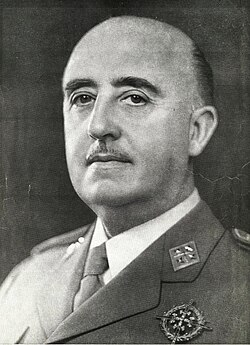35 years and 129 days:
Francisco Franco (1938–1973)
Francisco Franco (1938–1973)
13 years and 175 days:
Práxedes Mateo Sagasta
(1871–1872, 1874, 1881-1883, 1885-1890, 1892-1895, 1897-1899 and 1901–1902)
Práxedes Mateo Sagasta
(1871–1872, 1874, 1881-1883, 1885-1890, 1892-1895, 1897-1899 and 1901–1902)
13 years and 155 days:
Felipe González (1982–1996)
Felipe González (1982–1996)
11 years and 290 days:
Antonio Cánovas del Castillo (1874-1881, 1884-1885, 1890-1892 and 1895-1897)
Antonio Cánovas del Castillo (1874-1881, 1884-1885, 1890-1892 and 1895-1897)
8 years and 240 days:
Ramón María Narváez (1844-1846, 1847-1851, 1856-1857, 1864-1865 and 1866-1868)
Ramón María Narváez (1844-1846, 1847-1851, 1856-1857, 1864-1865 and 1866-1868)
5 days:
Vicente Sancho y Cobertores (1840)
Vicente Sancho y Cobertores (1840)
3 days:
Augusto Barcía Trelles (1936)
Augusto Barcía Trelles (1936)
1 day:
The Count of Clonard (1849)
The Count of Clonard (1849)
1 day:
The Duke of Rivas (1854)
The Duke of Rivas (1854)
1 day:
The Marquess of Mendigorría (1854)
The Marquess of Mendigorría (1854)
This is a list of prime ministers of Spain by time in office. The basis of the list is the inclusive number of days from being sworn in until leaving office.
Contents
Of the 102 prime ministers, only four served more than 10 years while sixty-six have served less than a year.
Francisco Franco, who also served as the Head of State until his death, is the only person to have served in the post of prime minister for more than two decades, ruling for a total of 35 years that were preceded by the coup of 1936 and the Spanish Civil War.









